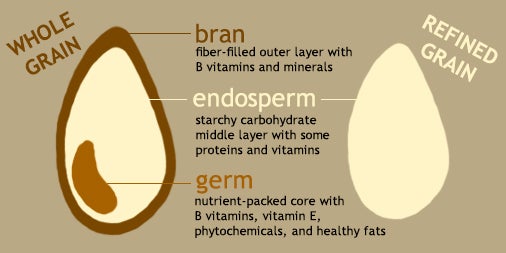8 of Hearts - Whole Wheat

Drop the white bread, go whole wheat instead! Next time you go to the shops, choose whole grains over refined grains.

Simply choose whole grains at the shops. Choose:
- Whole wheat bread over white bread
- Whole wheat pasta over white pasta
- Whole wheat flour over white flour
- Whole grain or steel-cut oats over rolled oats
- Brown rice over white rice
Because of the contents of a whole grain, they are typically darker in colour, while refined grains are lighter in colour (e.g., brown bread contains whole grains while white bread contains refined grains). When in doubt, choose the brown grain over the white grain. You get the idea!
To understand this tip, we must first understand the difference between whole grains and refined grains.
A single grain such as wheat, oat, or rice is made up of three distinct parts:
- The bran: This is the outer shell of the grain. It is rich in fibre and contains B vitamins and trace minerals.
- The germ: Nope, not the little crawlies that make you sick! This kind of germ is a small, nutrient-rich core inside the grain that contains B vitamins, vitamin E, antioxidants, phytochemicals and healthy fats.
- The endosperm: This is what makes up most of the volume of the inside of a grain. It is primarily composed of carbohydrates and also contains some protein.
Whole grains contain all three of these parts, as the name suggests. Conversely, a whole grain can be refined through a process called milling that removes the bran layer and the germ layer. Refined grains contain only the endosperm.

Photo taken from https://www.hsph.harvard.edu/nutritionsource/what-should-you-eat/whole-grains/
Refined grains are missing many of the amazing nutrients that are found in whole grains. Here is a list of what you’ll be getting from consuming whole grains and the benefits of these extra nutrients:
- Fibre – You’ve likely heard of fibre as an important part of a healthy diet, but did you know that our body doesn’t actually digest it? Instead, fibre helps our bodies digest other nutrients, gets fermented in the gut, and then excreted. Research has shown that fibre can:
- Improve bowel movements (i.e. less constipation, more regularity!)
- Help with fat loss by reducing caloric intake
- Improve metabolism, decreasing the risk of diabetes and other metabolic diseases
- Nurture the healthy bacteria living in your gut
- Reduce gut discomfort and inflammation
- Decreased risk of heart disease
- Decreased risk of colorectal cancer
- B vitamins – These vitamins found in whole grains are essential to the health of various types of cells in your body. B vitamins can:
- Strengthen your immune system
- Help with the growth of red blood cells
- Facilitate proper hormone function
- Improve heart health
- Improve eyesight, energy levels, brain function, digestion, and appetite
- Vitamin E: This vitamin is important for the health of your eyes, brain, blood, skin, and reproductive system.
- Antioxidants: Oxidation is a process that occurs in the body that may cause damage to various types of cells through unstable molecules known as free radicals. Antioxidants found in whole grains can help neutralise these unstable molecules, reducing the risk of various diseases.
- Healthy Fats: These fats found in the germ layer, called unsaturated fatty acids, are typically considered to be healthy fats because they are beneficial to the heart and blood vessels.
- Trace minerals: Whole grains contain micronutrients including iron, copper, zinc, and magnesium. These micronutrients play various roles in the body and are important for many cellular processes. Deficiencies in trace minerals can cause a variety of diseases in the body. The most commonly deficient mineral is iron, which can lead to a lack of physical and mental energy.
Make the healthy choice by replacing refined grains in your diet with whole grains. Your body will thank you!
Barber TM, Kabisch S, Pfeiffer AFH, Weickert MO. The Health Benefits of Dietary Fibre. Nutrients. 2020 Oct 21;12(10):3209. doi: 10.3390/nu12103209. PMID: 33096647; PMCID: PMC7589116.
https://www.healthline.com/health/food-nutrition/vitamin-b-complex#benefits
https://www.mayoclinic.org/drugs-supplements-vitamin-e/art-20364144
https://www.betterhealth.vic.gov.au/health/healthyliving/antioxidants#the-effect-of-free-radicals

 See Other Cards!
See Other Cards!